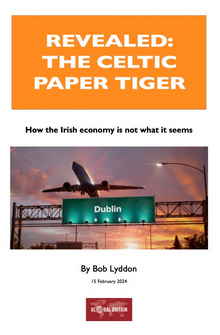Global Britain has released my report on the degree to which the economy of the Republic of Ireland is dominated by activities that reduce the tax bills of foreign multinationals.
You can download the report here.
The report dissects the two elements of tax-sparing activities:
- the re-invoicing through Ireland of goods made elsewhere and services performed elsewhere, re-invoiced by the subsidiaries of foreign multinationals – this activity amounted to €360 billion in 2022
- the financing and leasing of aircraft that never go to Ireland – the lease rentals on this fleet amounted to €104 billion in 2022
Both activities have been quantified via original research, rather than by reliance on the underestimates issued by the Irish authorities.
Both activities create paper trails for accounting and tax purposes, separate from where the underlying business occurs. The major part of the ‘Celtic Tiger’ economy consists of creating these paper trails: this tiger really is a Paper Tiger.
The two ‘offshore’ activities together, in 2022, amounted to €464 billion, €215 billion more than the figure of €249 billion that the Irish authorities gave for ‘onshore’ activities: the sales of goods and services by Irish businesses.
Adding the €249 billion ‘onshore’ economy to the €464 billion ‘offshore’ economy gives a 2022 Gross Domestic Product for Ireland of €713 billion – not the €503 billion put out by the Irish authorities.
The ‘offshore’ economy represents 65% of the ‘Celtic Tiger’, as well as bringing in most of its corporation tax, high-salary jobs, personal income tax, and social taxes – no wonder the Irish authorities want to keep that under wraps.
The Irish authorities issue figures for the personal income tax and social taxes deriving from the ‘offshore’ sector, but they have included only the people directly employed by the sector, and not the army of accountants, lawyers, tax advisers, bankers and so on who exist to service it, let alone any figures for the proportion of the ‘onshore’ economy that is dependent on the ‘offshore’ one.
This mammoth distortion is what the proponents of a United Ireland would have the people of Northern Ireland join in with.
It is bound to blow up at some stage, and with spectacular results. One can look back to the national bankruptcy of 2010, which required a bailout by European institutions, the International Monetary Fund and, bilaterally, from Sweden, Denmark and the United Kingdom (not that these bailout monies have yet been fully repaid).
One can look further back to 1992 and the bankruptcy of the Guinness Peat Aviation leasing concern: Ireland now has three or four giant aircraft leasing concerns as part of its ‘offshore’ economy.
Once united with the Republic, the people of Northern Ireland will get to share the pain of a blow-up without having partaken in the pleasure.
Even better, they will get to pay up in EURO.

